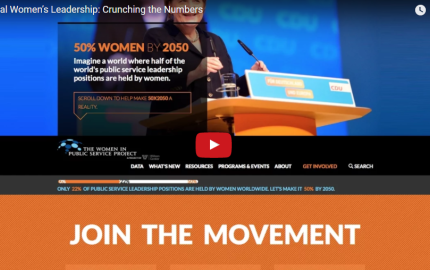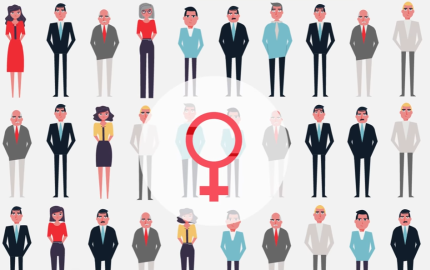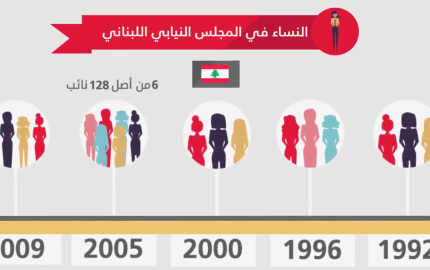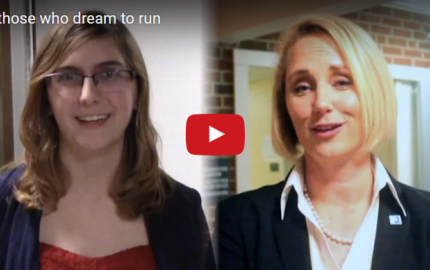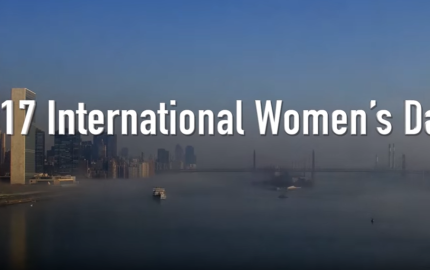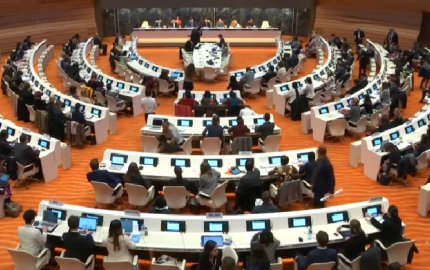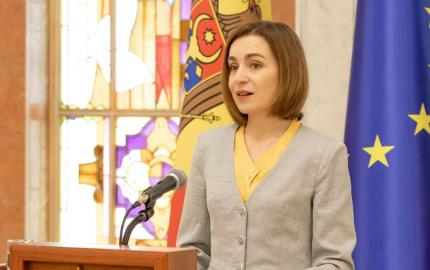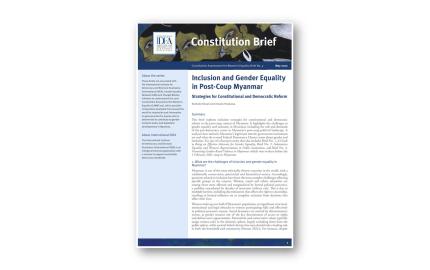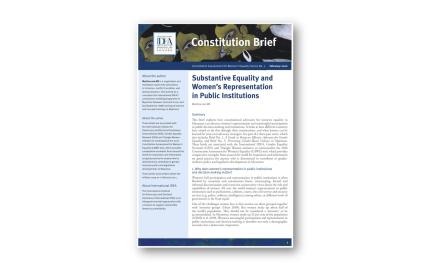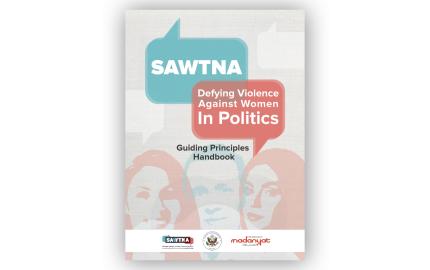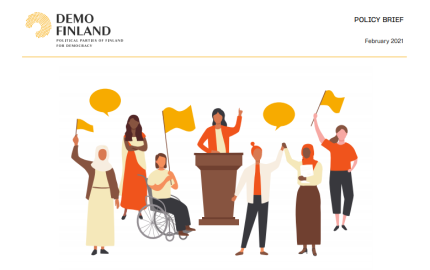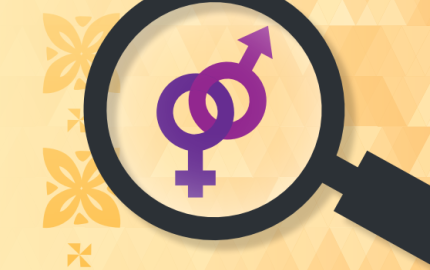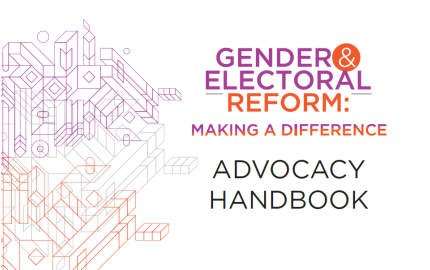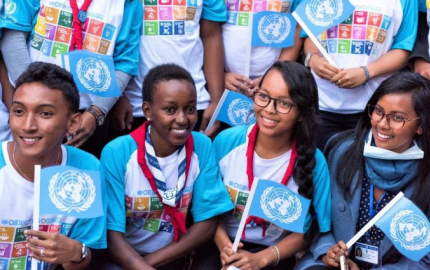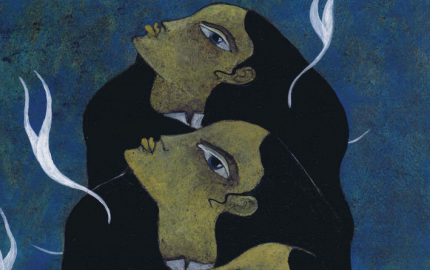Advocacy & Lobbying
Main navigation
The Women in Public Service Project’s “50 x 50” initiative has a new tool to help chart a course toward its goal of gender equality in decision-making positions in public service by 2050. A growing data base on global women’s leadership can now be accessed at data.50x50movement.org. The Wilson Center's John Milewski asked WPSP director Gwen K. Young to talk about what crunching the numbers can mean to achieving the ultimate goal.
Click here for more details.
The clips aim at building understanding among Lebanese stakeholders, and especially political decision-makers, on the range of possible temporary special measures that can be adopted to encourage and increase women’s participation in elections, including but not limited to quota.
It was prepared and produced by the United Nations Development Programme (UNDP) - Lebanese Elections Assistance Project (LEAP) - Lebanon, and funded by European Union.
The clips aim at building understanding among Lebanese stakeholders, and especially political decision-makers, on the range of possible temporary special measures that can be adopted to encourage and increase women’s participation in elections, including but not limited to quota.
It was prepared and produced by the United Nations Development Programme (UNDP) - Lebanese Elections Assistance Project (LEAP) - Lebanon, and funded by European Union.
Findlay Mayor Lydia Mihalik was the lone Republican participant in a panel discussion on “women in politics” on 23 March 2017, but she was excited by the idea that some of the female Democrats present might join her in city government.
“I’m really excited about the opportunity to have more women on council,” Mihalik said.
Findlay City Council is currently comprised of 10 men and 1st Ward Councilwoman Holly Frische.
Three at-large City Council candidates — Mary Harshfield, Barbara Lockard and Heidi Mercer — participated in the panel Thursday night at the University of Findlay. Also present were gubernatorial candidate Connie Pillich, a former Cincinnati legislator; Janet Garrett of Oberlin, who ran for 4th District congressional seat in November; and Ohio 1st District Senate candidate Ashley Phillip of McComb.
Women in political races might not be seen as the rare “unicorns” they once were, but they’re still underrepresented, Mihalik said.
“There are young girls now that eventually will have the opportunity to choose to run for elected office,” she said. “And it will be a lot easier for them if we can do our part now.”
Click here to read the full article published by The Courier on 24 March 2017.
International Women’s Day is a time to reflect on progress made, to call for change and to celebrate acts of courage and determination by ordinary women who have played an extraordinary role in the history of their countries and communities.
The idea of this theme is to consider how to accelerate the 2030 Agenda, building momentum for the effective implementation of the new Sustainable Development Goals, especially goal number 5: Achieve gender equality and empower all women and girls; and number 4: Ensure inclusive and quality education for all and promote lifelong learning. The theme will also focus on new commitments under UN Women’s Step It Up initiative, and other existing commitments on gender equality, women’s empowerment and women’s human rights.
Visit the United Nations website here to learn more.
Hundreds of youth activists, representatives from youth organizations, UN and government officials gathered at the United Nations Office in Geneva on November 21-22 to attend the first-ever Forum on Human Rights, Democracy and the Rule of Law.
The Forum, established by Human Rights Council resolution 28/14 adopted on March 26, 2015, provided an important platform for promoting dialogue and cooperation on the relationship between the areas of human rights, democracy and the rule of law. In particular, this year’s inaugural session focused on “Widening the Democratic Space: The Role of Youth in Public Decision-Making.”
The Secretary-General’s Envoy on Youth, Ahmad Alhendawi, together with H.E. Ambassador Daniiar Mukashev, Permanent Representative of the Kyrgyz Republic to the United Nations in Geneva, co-chaired the Forum. The formal discussions of the two-day event focused on creating an enabling environment for the effective participation of youth in public decision-making and on ways to increase the participation of young people in public and political processes. Through a set of four diverse plenary sessions that included panel presentations followed by interactive discussions, participants identified and analyzed best practices, challenges and opportunities for Member States in their efforts to widen the democratic space for youth in public decision-making.
In his opening remarks, the UN High Commissioner for Human Rights, Zeid Ra’ad Al Hussein, underscored the importance of safeguarding the political participation of young people, highlighting their crucial contributions to peace, international justice and human rights. He further reminded participants that no democratic change has ever occurred without the engagement of young people and their work.
Mr. Alhendawi emphasized the need to make politics and political participation both appealing and accessible to young people. “Young people appreciate making politics more accessible, and the question of youth rights is at the heart of this,” Mr. Alhendawi said during the Forum’s opening session. “This should the overarching theme for all our efforts.”
Read more here.
This paper examines the barriers that still inhibit women’s political participation in Georgia, Moldova, and Ukraine. It explains the main roots of women’s underrepresentation, first looking at public attitudes in the three countries regarding the efficiency of women politicians and the male-dominated political environment. Based on interviews with women politicians in the three countries, the research focuses on the use of gender quotas for participation in elections at the national and local levels. It describes the path to introducing gender quotas and explores the factors that determine the limits of their effectiveness. The paper then looks at other instruments for mainstreaming gender-balanced policies and their enduring limitations.
The paper offers recommendations for domestic and external actors—including lawmakers, political parties, the media, and foreign donors—on possible ways to enhance women’s participation with policy approaches concerning female leadership and gender-balanced decision-making.
Click here to access the policy paper.
This brief explores inclusion strategies for constitutional and democratic reform in the post-coup context of Myanmar. It highlights the challenges to gender equality and inclusion in Myanmar, including the role and demands of the pro-democracy actors in Myanmar’s post-coup political landscape. It analyses how inclusive Myanmar’s legitimate interim government institutions are and what the revised Federal Democracy Charter states about gender and inclusion.
It is one of a four-part series that also includes Brief No. 1. A Guide to Being an Effective Advocate for Gender Equality, Brief No. 2. Substantive Equality and Women’s Representation in Public Institutions, and Brief No. 3. Preventing Gender-Based Violence in Myanmar, which were written before the 1 February 2021 coup in Myanmar.
Click here to access the paper.
This brief explores how constitutional advocates for women’s equality in Myanmar can advance women’s representation and meaningful participation in public decision-making and institutions. It looks at how different countries have aimed to do this through their constitutions, and what lessons can be learned for your own advocacy strategies.
It is part of a four-part series, which also includes Brief No. 1. A Guide to Being an Effective Advocate for Gender Equality, and Brief No. 3 Preventing Gender-Based Violence in Myanmar and Brief No. 4. Inclusion and Gender Equality in Post-Coup Myanmar.
Click here to access the report.
The massive participation of women in the protest movements during the October 17, 2019 revolution and the way they took charge of handling the Covid-19 pandemic where women’s concerns were brought to the forefront, could give the false impression that the battle for their participation in politics has been won. Unfortunately, this is not the case. It seems that the old discriminatory mechanisms related to access to power persist and the increasing visibility of women in the public sphere comes at a high cost where they run the risk of becoming targets. With the rise in verbal and physical violence against women in the public life, something had to be done. In November 2020, Madanyat, with the support of the Public Affairs Section at the U.S. Embassy in Beirut, launched the program Sawtna defying violence against women in politics, which this publication is part of, to specifically address harassment on social and traditional media targeting women politicians, activists, and journalists.
Click here to access the full report published by Madanyat.
Strengthening Women’s Political Participation (2021) provides an overview of the political participation of women and reasons for their underrepresentation in politics. It includes recommendations for donors, national governments and political parties on how to strengthen women’s participation in politics.
Click here to see the policy brief published by Demo Finland on 1 March 2021.
Gender is a critical dimension of parliamentary scrutiny. Considering laws, policies, programmes and budgets from a gender perspective ensures that they are fair to both men and women.
This leads to better decision-making for everyone. This UNDP practical guide is for Members of the Fiji Parliament on how to scrutinise legislation from a gender perspective, in the day-to-day work of a parliamentarian. It is not an academic or theoretical description of the concepts of gender, equality or analysis but is designed to be a practical document.
While the toolkit specifically focuses on the scrutiny of legislation, the ideas can be applied to the scrutiny of policies and programmes too.
Click here to access the report.
The World Economic Forum predicts that the gender gap will not close entirely until 2186. At 106 out of 144 countries, Malaysia’s 2016 Global Gender Gap Index indicates that the biggest inequalities exist in terms of women’s political empowerment. In continuity of National Conference on Gender & Electoral Reform: Making A Difference – a groundbreaking public conversation on women’s representation in elected office held in August 2016, this advocacy handbook is part of the effort to raise awareness and advocate for gender & electoral reform within Malaysia.
Click here to access the handbook.
The 2030 Agenda for Sustainable Development, adopted in 2015, is the international community’s ambitious response to today’s most pressing global development challenges and will guide our development priorities for an entire generation. Young people played a key role in shaping this agenda and experience first-hand many of the issues it seeks to address.
Recent decades have witnessed significant advances in terms of human development, but deep challenges remain. Progress has been uneven, with many young people across the globe still experiencing interlocked forms of discrimination, limited political inclusion, high levels of poverty, and limited access to health systems, educational opportunities and decent jobs.
The goals and targets of the 2030 Agenda are interconnected, aiming to integrate the three dimensions of sustainable development: economic, social and environmental. Explicitly or implicitly, young people are deeply embedded within their fabric. Their knowledge, reach and innovative solutions are essential if sustainable development is to be realized.
The story of women’s political empowerment in the Pacific continues to be one of struggle and hardship. Commitments have been made by Pacific Leaders to facilitate women’s entry into politics. While some countries have translated these commitments into tangible actions, many have not. This publication aims to showcase the success stories, and the lessons learned along the way in implementing Temporary Special Measures (TSMs) in the Pacific, so that where the path is still to be travelled, it may benefit from those who have gone before. This publication mirrors the high quality discussions of the Pacific Regional Conference on TSMs, held in Port Moresby in November 2015. This conference was a joint initiative of UNDP, the Pacific Islands Forum Secretariat and UN Women’s Multi-Country Office in Fiji, with the financial support of the Australian Aid program.
Click here to access the publication.
The constitution-building process provides an extraordinary opportunity for women and gender-equality advocates to participate in the framing of democratic institutions. The Constitution Assessment for Women’s Equality helps users analyse a constitution or draft constitution from the perspective of the substantive equality of women. Using a series of questions, short explanations and example provisions from constitutions around the world, the Assessment guides you through an examination of the most critical constitutional issues that affect women’s rights and gender equality.
This Assessment is designed for gender-equality advocates as well as those who are engaging in the topic of women’s constitutional rights for the first time, whether as members of a constituent assembly, constitutional drafters, civil society members or concerned individuals. Since gender equality affects the quality of democracy and society as a whole, the Assessment is a resource for both men and women.
Click here to access the guide.
